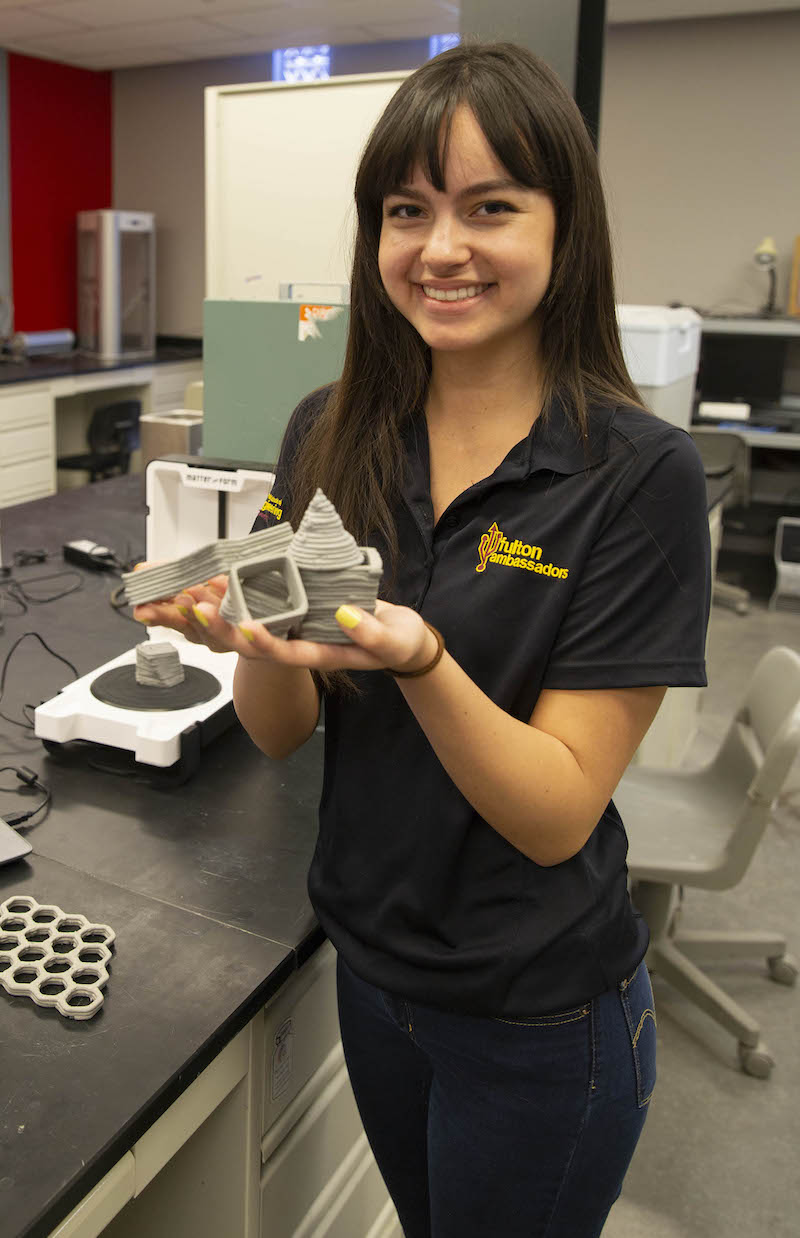Fulton Schools’ youngest graduate gets head start on making an impact

Emily Alcazar, who is graduating with a Bachelor of Science in civil engineering at 17 years old, wants her legacy to be more than just earning a degree at a young age. She wants her work to be inspirational and contribute to society. Photo courtesy of Emily Alcazar
Editor’s note: This is part of a series of profiles for spring 2019 commencement.
Emily Alcazar started taking college courses when she was 12 years old. This month she graduated magna cum laude from the Ira A. Fulton Schools of Engineering at Arizona State University with a bachelor’s degree in civil engineering at the age of 17. She is the youngest graduate out of more than 2,600 students in the Fulton Schools’ spring 2019 graduating class.
“Starting college so young made my academic accomplishments impressive merely because of my age,” said Alcazar. “Because of this, I knew I wanted my legacy to be more than earning a degree at a young age. I wanted my work to be inspirational and contribute to society. Civil engineering allowed me to do that through emphasizing topics such as environmental issues, water treatment processes, transportation, structural analysis and more.”
The Gilbert, Arizona, native received a Maricopa County Community Colleges All-Arizona Academic Team Scholarship in 2015 while a student at South Mountain Community College.
“The scholarship provided me with a full ride to any public university in Arizona,” said Alcazar. “ASU has the strongest engineering program and I’m very glad I chose to join the Ira A. Fulton Schools of Engineering.”
Alcazar, who was homeschooled for high school, has been a very active member of the ASU community during her undergraduate years. She participated in the Fulton Undergraduate Research Initiative, better known as FURI, for two semesters in the lab of Professor Narayanan Neithalath studying 3D printing of concrete.
“The various applications of this technology, such as providing affordable housing to developing countries, innovative architecture and implementing sustainable materials, gave me immense motivation to join (Dr. Neithalath’s) research group,” said Alcazar. “During my time in this lab, I gathered 3D point cloud imaging data and conducted pressure cell tests on various concrete mixes.”
Alcazar was also involved in Fulton Ambassadors, served as a teaching assistant, was a member of the AZLoop Hyperloop Team and was a member of Chi Epsilon, the civil engineering honors society.
In addition to her various roles within the Fulton Schools, Alcazar is also an example to her two younger siblings who are following in her footsteps. One sister is currently enrolled at ASU as a molecular biosciences and biotechnology major in ASU’s School of Life Sciences at age 16, while her youngest sister has already been accepted to ASU at age 13, though she won’t enroll for another two years.

Emily Alcazar worked with Professor Narayanan Neithalath to advance the current state of 3D-printed concrete for its industrial use in the future as a means of faster, cheaper and cleaner construction. Photographer: Jessica Hochreiter/ASU
“(My siblings) have been able to see that ASU has many opportunities that allow you to individualize your undergraduate career,” said Alcazar. “This experience helps you to figure out what you want to pursue in your field and be a competitive applicant for future endeavors.”
The future has a lot in store for this high-achieving graduate. Alcazar will continue her education in the fall when she begins studies toward a doctoral degree at Georgia Tech in Atlanta, where she’ll work under Professor Glaucio Paulino on structural topology optimization with the implementation of machine learning.
“After stressing and doubting myself during the graduate school application process,” said Alcazar, “the most rewarding outcomes of my undergraduate experience was getting accepted into Stanford, Berkeley, Georgia Tech and other noteworthy institutions for graduate school.”
Alcazar's favorites:
- Hobbies: Playing the cello and piano.
- Performer: Rex Orange County.
- TV Show: "Blacklist."
- Activity: Yoga
- Last Book Read: "The Immoralists" by Chloe Benjamin.
- Geeky Possession: Plan sets from my work.
More Science and technology

Hack like you 'meme' it
What do pepperoni pizza, cat memes and an online dojo have in common?It turns out, these are all essential elements of a great…

ASU professor breeds new tomato variety, the 'Desert Dew'
In an era defined by climate volatility and resource scarcity, researchers are developing crops that can survive — and thrive —…

Science meets play: ASU researcher makes developmental science hands-on for families
On a Friday morning at the Edna Vihel Arts Center in Tempe, toddlers dip paint brushes into bright colors, decorating paper…

